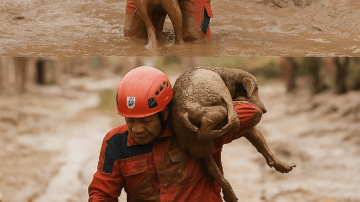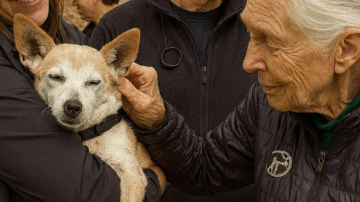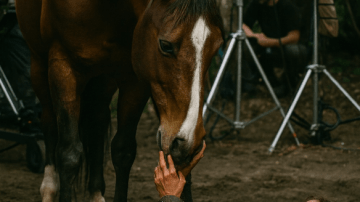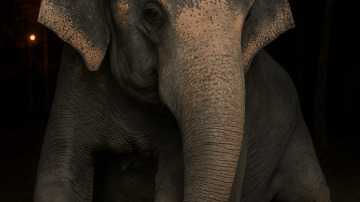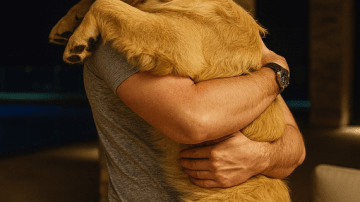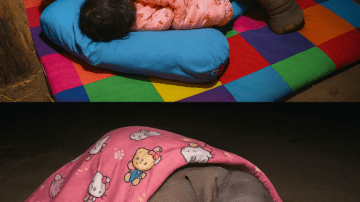Have you ever witnessed something so cruel that it made you question humanity itself? That was the moment I first met him. His name, though unknown to me then, would later be Soberatino.

It began as an ordinary day, one I thought I would forget by evening. But fate had prepared a moment that would mark me forever. Among the piles of rotting garbage, broken bottles, and twisted scraps of metal, I noticed a flash of blue. A plastic bag. At first I walked past it, dismissing it as trash like everything else scattered around. Something, however, urged me to stop and look again.
Inside that crumpled bag, a head poked out. A dog’s head. The rest of his body was hidden inside, motionless, lifeless. His eyes were open, staring directly at me. For a terrifying second I thought I was staring into death itself. Then I saw it: a faint twitch, a shallow breath.
Flies swarmed over his skin, eating away at his flesh. His nose trembled but his body lay completely still, as if he had surrendered to the cruelty of the world. I knelt closer. “Are you alive?” I whispered. There was no bark, no whimper. Only those eyes—tired, heavy, yet filled with a silent plea. They seemed to whisper: please, do not leave me here.
My hands shook as I pulled him from the bag. He weighed almost nothing, only skin and bone, yet he carried the unbearable weight of suffering. In that moment I knew I could not turn away. His story, his survival, was now my responsibility.
We rushed him to the veterinarian, uncertain if he would survive even the next hour. His body was a battlefield. Thousands of fleas crawled across his skin. Hundreds of ticks fed greedily on his blood. His gums were pale from anemia. And yet, not once did he growl or snap. He had no fight left in him. Only silent endurance and a fragile thread of life.

The team moved quickly. Warm water washed away the parasites clinging to him. Gentle hands dried his frail body, whispering: “You are safe now. You are not alone.” I wanted him to believe it. I needed him to believe it. But Soberatino could not eat. His jaw trembled when we tried. His tongue barely moved. His body was shutting down. IV fluids were started, clear hope dripping into his veins. He fell asleep on the cold table as if his soul had finally found a moment of peace.
Inside his mouth the vet found a gaping wound filled with maggots that had made their home there for days. Carefully, patiently, the vet removed them one by one. His ears were worse, infected so deeply we feared he might never hear again. I wrapped him in a soft blanket, tears pressing at my eyes. “Stay with us, little fighter. You are not alone anymore.”
Three days later, something extraordinary happened. Soberatino opened his eyes wider and for the first time they were not just pools of pain. He sniffed at a bowl of food, his tongue trying to move. It was more than instinct. It was a choice. He was choosing to live. Tears of joy streamed down my face.

By the tenth day he limped into the garden. His legs shook with every step, but he walked. Slow, fragile, uncertain, yet each paw pressed into the earth carried a spark of hope. To see him walk was like watching dawn break after the longest night. Dogs have this remarkable gift of forgiving the world even when it has broken them. Soberatino, scarred and fragile, was teaching me that lesson with every shaky step.
But recovery is never a straight line. On the fourteenth day fever struck and he collapsed unconscious. My heart dropped into darkness. “Not now,” I whispered, pressing my forehead to his. “You have come too far.” We prayed again, waiting in agonizing silence. And then, slowly, he opened his eyes. Weak, but alive. The fighter within him had returned.
By the twentieth day sunlight streamed across his fur as he sat in the grass. His eyes were brighter. His chest rose with strength. And for the first time, his tail wagged. Just once, small and tentative. But it was enough to make my heart burst. It was the gesture of a soul that had found joy again.
On the thirty-fifth day he walked around the house, stronger and steadier. His steps were no longer just for survival; they were steps of belonging. He was no longer a discarded shadow but a dog reclaiming his life.

Word spread quickly. Pictures of his recovery traveled far beyond our town. Messages poured in from strangers across the world. Families wanted to adopt him. They saw not just a broken dog but a survivor, a fighter, a soul worth saving. And finally, Soberatino had a home.
He would never curl inside a plastic bag again. He would sleep on a warm bed. He would eat from a clean bowl. He would no longer be ignored in his suffering but kissed goodnight every single night. The past—the maggots, the ticks, the hunger, the fear—would fade into a distant memory. What remained was a life reclaimed, a spirit reborn. Because Soberatino chose to live, and this time the world chose him back.
And as I watch him now, safe and loved, one question never leaves my mind. What if I had walked past that bag? What if I had ignored that faint flicker of life? Would you have stopped? Would you have opened it? Sometimes the smallest choice holds the power to save an entire world—the world of a soul who refuses to surrender.

